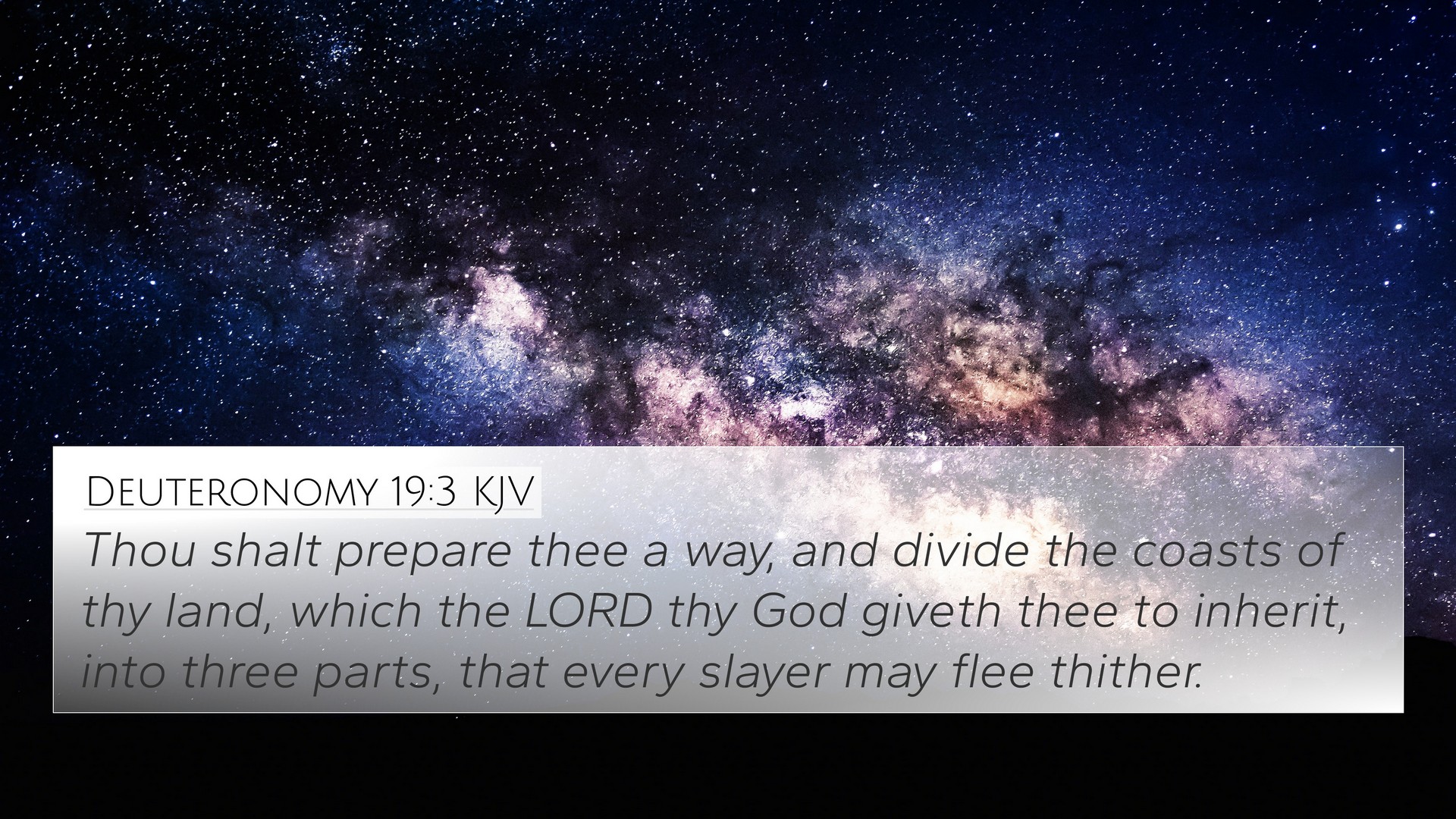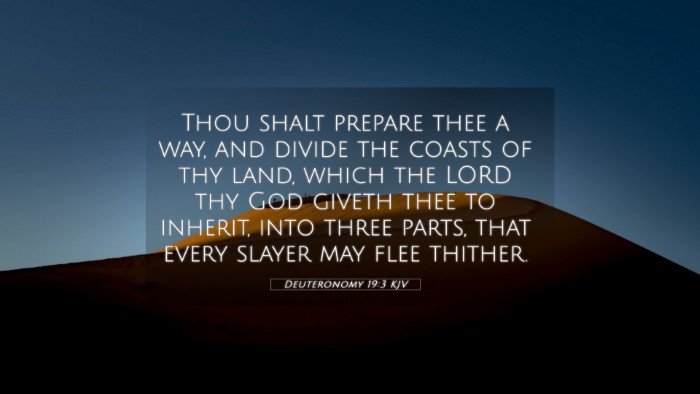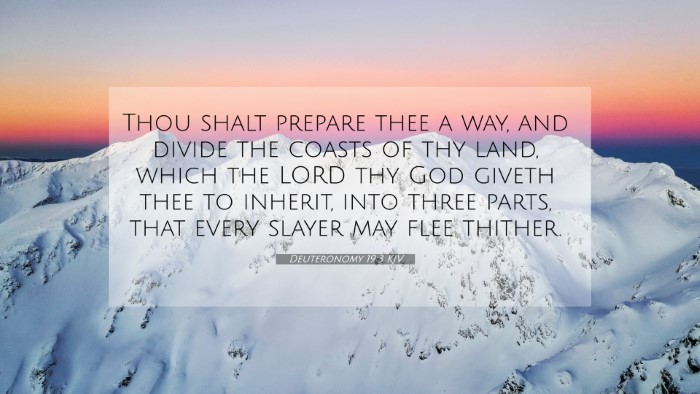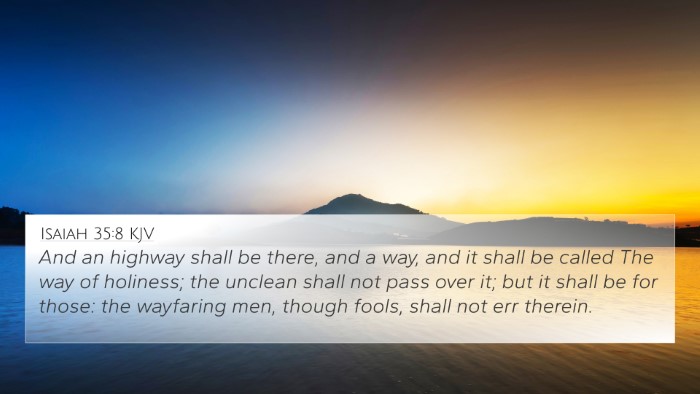Understanding Deuteronomy 19:3
Bible Verse: Deuteronomy 19:3
"Thou shalt prepare thee a way, and divide the coasts of thy land, which the Lord thy God giveth thee, into three parts, that every slayer may flee thither."
Summary of Meaning
Deuteronomy 19:3 articulates God’s instruction to the Israelites regarding the establishment of cities of refuge.
The intent behind these cities was to provide asylum for those who unintentionally committed manslaughter, ensuring they received a fair chance at protection and justice.
This verse emphasizes the need for structure in society and God's desire for mercy within the legal framework.
Commentary Insights
-
Matthew Henry:
Matthew Henry highlights the grace and mercy of God in providing sanctuaries where the accidental slayer can find refuge.
Henry points out that this ordinance reflects God's justice and mercy, allowing those who have unintentionally harmed others to avoid retribution and find a safe haven.
-
Albert Barnes:
Albert Barnes emphasizes the importance of distinguishing between murder and manslaughter.
He remarks on the societal structure that must be established to prevent the taking of the innocent life and the need for geographical and societal provisions for justice and mercy.
-
Adam Clarke:
Adam Clarke explains the significance of “preparation” in the context of intentionality behind the cities' establishment.
He notes that these cities serve a dual purpose: protection for the innocent and a means to implement just governance.
Connections to Other Bible Verses
Deuteronomy 19:3 serves as a part of a greater narrative within the Biblical text, establishing themes of justice, mercy, and protection.
Here are relevant cross-references that reflect similar themes:
- Numbers 35:6: This verse also discusses the cities of refuge and their purpose for unintentional murderers.
- Joshua 20:2-3: It reiterates the command to designate cities of refuge as described in Deuteronomy.
- Exodus 21:13: Discusses the concept of cities of refuge and the protection they afford.
- Hebrews 6:18: This New Testament verse refers to God’s promises, emphasizing refuge found in Him, akin to the cities established in the Old Testament.
- Psalms 91:2: Portrays God as a refuge, similar to those cities meant for the innocent.
- Matthew 5:21-22: Jesus’ teaching on murder and anger connects back to the importance of understanding intention and consequences in the law.
- Romans 13:4: Paul speaks of civil authorities as God's servants for justice, which relates to the purpose of the cities of refuge.
Thematic Analysis
The major themes in Deuteronomy 19:3 resonate with:
- Justice: The distinction made between intentional and unintentional actions signifies a deeper principle of fairness in society.
- Mercy: The provision of refuge demonstrates God’s character as merciful, allowing for corrective justice rather than retributive.
- Community Responsibility: The setup promotes a collective societal approach to safeguarding life and enforcing just governance.
Practical Application
Understanding the intent behind Deuteronomy 19:3 serves as a cornerstone for exploring issues of justice and mercy in contemporary society.
The principles of providing protection, advocating for fairness, and creating systems to ensure the innocent are not wrongfully punished remain vital today.
By examining such scriptures in connection with one another, one can gain deeper insight into the desires of God for humanity.
Further Studies
For those interested in Bible cross-referencing, several tools and methods can enhance understanding through comparative studies:
- Bible Concordance: A must-have resource for identifying themes and connections.
- Cross-Reference Bible Study: Engages readers in topical studies, enhancing their understanding of the scripture.
- How to Use Bible Cross-References: Learning to navigate these references effectively can deepen biblical understanding.
- Bible Chain References: Techniques for following themes throughout scripture.
Conclusion
In conclusion, Deuteronomy 19:3 offers rich insights that are interwoven with the fabric of biblical justice and mercy.
By identifying connections between verses, one can appreciate the overarching themes that God provides throughout scripture.
It encourages believers to reflect on the balance between justice and mercy in their own lives and communities.






